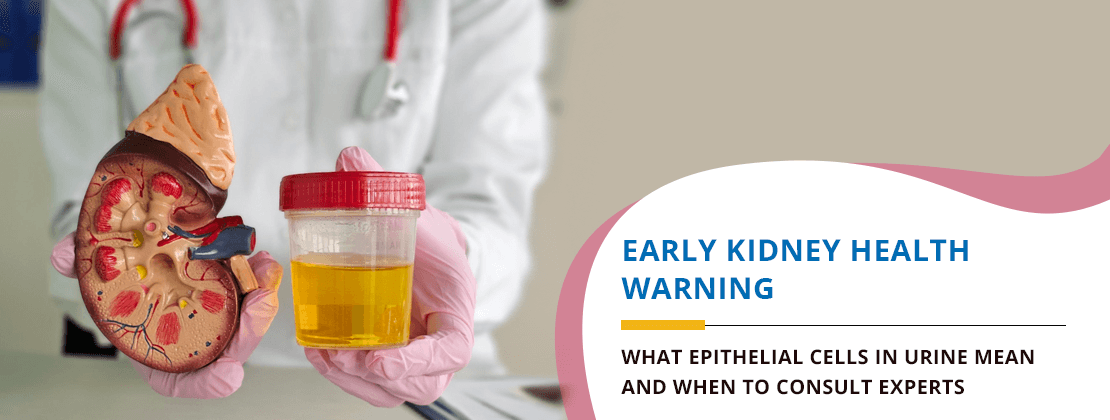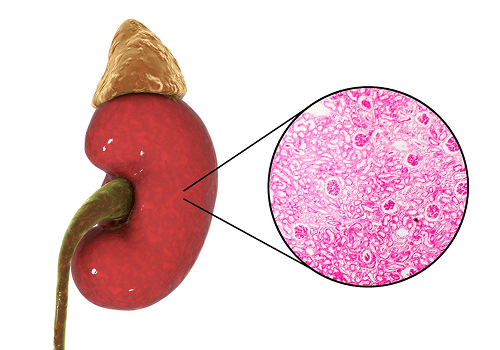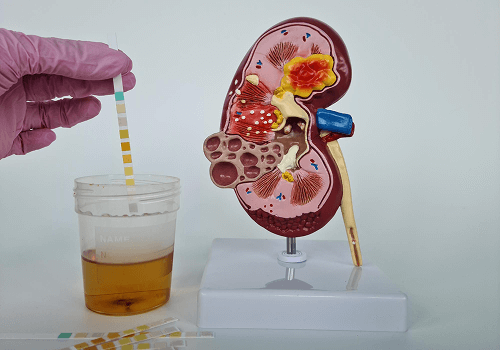
Home / Blog / Early Kidney Health Warning: What Epithelial Cells in Urine Mean and When to Consult Experts
Kidney health often goes unnoticed until problems become severe. One of the first signs of potential kidney issues can be detected in a simple urine test—epithelial cells in urine.
Even though these results are usually overlooked, they can be used to recognise kidney problem symptoms, avoid complications, and advise on timely medical consultation.
In India, where conditions like diabetes, hypertension, and kidney stones are common, awareness about kidney health is crucial. Chronic kidney disease (CKD) affects more than 17% of the Indian population, as stated by the Indian Society of Nephrology.
Most patients are not aware of their condition until it is too late to treat them. Adding to this, research shows that every tenth adult in India is at risk of kidney-related disorders, highlighting the urgent need for regular urine and blood tests.
Read this blog to learn what the presence of epithelial cells in urine says, the signs that should make you worry, and, most importantly, when to consult a kidney specialist or visit a urology hospital.
At HCG Hospitals, a leading urology hospital in India, we offer comprehensive kidney care solutions. If you are looking for the best kidney specialist in India, visit HCG Hospitals today.

Epithelial cells are those that cover the surfaces of organs such as the urinary tract. It is normal to have some epithelial cells in urine since they are naturally excreted by the body. However, a higher epithelial cell range in urine may suggest an infection, inflammation, or underlying kidney problem.
Urinalysis is important in the early detection of abnormalities that may not be accompanied by obvious kidney disease symptoms. The number and kind of epithelial cells are what doctors normally use to decide whether they should carry out additional tests.
The type of epithelial cells found in urine plays a major role in diagnosis:

An abnormal range of epithelial cells in urine may be linked to:
Almost 12% of the Indian population suffers from kidney stones, which are more common in men than in women. Therefore, it is crucial to take preventive lifestyle measures and undergo regular check-ups.
Although a lot of individuals with high epithelial cells may be asymptomatic at first, the following are some common indicators of kidney problems that one should not overlook:
In case you see any of these signs of kidney disease, make sure to seek the attention of a kidney specialist in India without any delay.
Not all cases of epithelial cells in urine indicate a serious problem. But you should consult a doctor if:
Patients in India often seek hospital care too late due to a lack of awareness regarding the significance of urological health and the need for early detection.
Paying attention to persistent symptoms is the key to early detection and timely interventions.
Treatment depends on the underlying cause:
At HCG, which is a leading super-speciality hospital in India, we have highly experienced nephrology and urology experts who can treat a wide range of urological problems with comprehensive treatment plans.
Additional Reading: Managing Kidney Disease: Expert Insights and Best Practices – HCG Hospitals
Since kidney damage can be hard to treat, it’s better to prevent it altogether. Here are a few habits that can help protect your kidneys:
Additional Reading: The Importance of Kidney Health: A Comprehensive Guide
Epithelial cells in urine are often overlooked, but they can serve as an early warning sign of kidney problems. Timely detection, lifestyle changes, and medical consultation can prevent complications of the increasing cases of kidney diseases in India.
If your test shows abnormal results or you have kidney disease symptoms, do not ignore them. Visit a kidney specialist in India at HCG, the trusted urology hospital in India, for expert care. Early action is the key to protecting your kidneys and leading a healthy life.